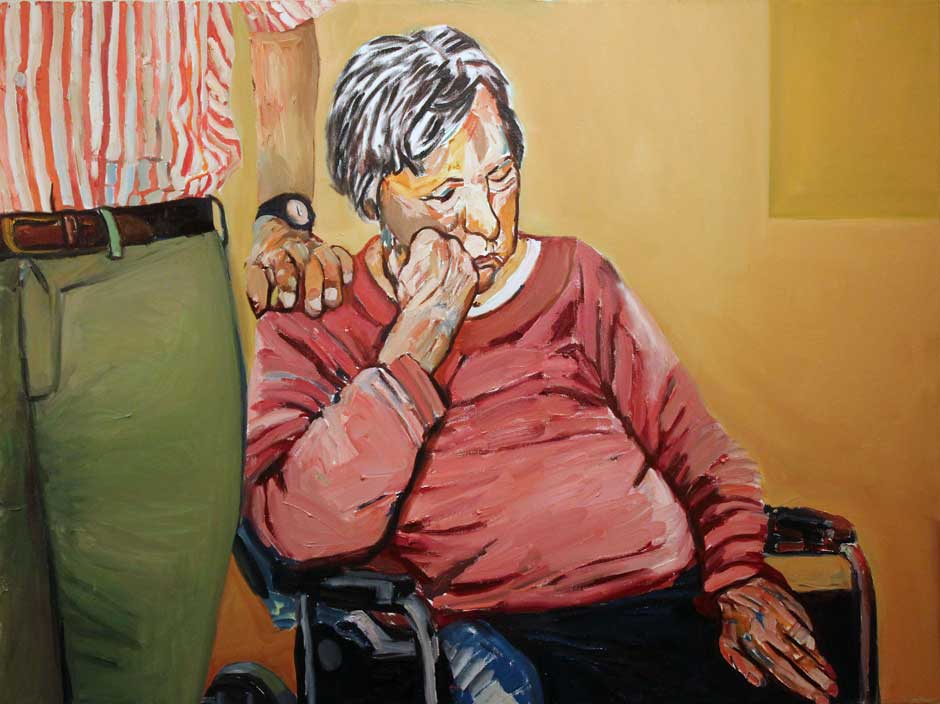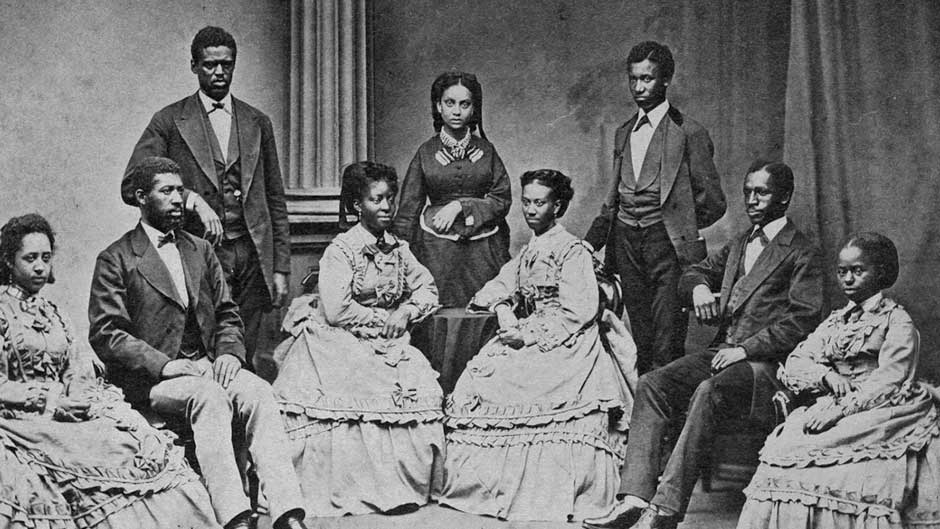My mother died on the fall equinox in Friends Homes, a retirement community in the old Quaker settlement of New Garden, on the outskirts of Greensboro, North Carolina. Having suffered a series of brutal strokes and a deepening dementia over her previous eight bedridden years, she had left contradictory instructions about arrangements for her death. She told my father, firmly, that she didn’t want a memorial service. And she told me, just as firmly, that she wanted “Swing Low, Sweet Chariot”—“the cradle-song of death which all men know,” as W. E. B. Du Bois called it—sung at her memorial.
It has been suggested by some historians that “Swing Low” (along with “Roll, Jordan, Roll,” which figures movingly in the current film Twelve Years a Slave) may be among those songs with coded meanings related to the Underground Railroad—as much about finding safe haven in the North as finding a home in heaven. Frederick Douglass wrote about such double meanings in My Bondage and My Freedom: “A keen observer might have detected in our repeated singing of ‘O Canaan, sweet Canaan, I am bound for the land of Canaan,’ something more than a hope of reaching heaven. We meant to reach the north—and the north was our Canaan.”
Serendipitously, my mother got both of her memorial wishes. On October 27, a Sunday morning, my brothers and my sister, our spouses, and some of our children, joined my father to distribute her ashes in the woods between Friends Homes and the New Garden Cemetery, under the same trees where the ashes of my father’s mother, like him a Jewish refugee from Nazi Germany, were laid to rest. Then, we went to a Quaker meeting nearby, all fifteen of us, unannounced, and joined in the hour of silence, broken only when someone was “moved by the spirit”—hence the “Quaker” moniker—to speak.
My father, clearing his throat just as he did when we were children sitting impatiently through the meeting back home in Indiana, was the first speaker. He explained why we were there and he mentioned my mother’s two requests. He sat down and the silence descended again. Then, in a rich baritone—and even though “silent” meetings never include the singing of hymns—a member of the meeting began singing the chorus of “Swing Low.” Everyone knows the beauty of this song, spread across the world by the Fisk Jubilee Singers after the Civil War, how the melody enacts the meaning of the words, swinging down to the word “low,” then even lower for the word “chariot,” before swooping upward “to carry me home.” Other voices joined in, adding harmony and an echoing “swing low,” and even, stunningly, a soprano descant.
The next day was my fifty-ninth birthday, and my wife and I stopped by the woods again. We could see up over the rise to the New Garden Cemetery, where the poet Randall Jarrell, who lived for many years in this neighborhood, is buried under a huge oak tree, surrounded by nameless British soldiers in unmarked graves, who died far from home in the Battle of New Garden in the American Revolution.
Nearby, also in the cemetery, is a stone marker indicating the site of the old New Garden Meeting House, and marking the location of the brick schoolhouse where the Quaker abolitionist Levi Coffin taught slaves to read. Born on October 28, my birthday, in 1798, Coffin had migrated down with his family from land-poor Nantucket—the Coffins are mentioned in Moby-Dick—to settle in flourishing New Garden.
Coffin later moved to Indiana to get out of the slaveholding South, and served as director of a bank in our hometown of Richmond. In Indiana, he met Harriet Beecher Stowe, who modeled a character on him in Uncle Tom’s Cabin. Coffin, as it happens, was the subject of my very first published essay, written, I am sure, with a great deal of help from my mother, when I was twelve. My essay won first prize in a little contest for kids sponsored by our local paper, The Palladium-Item.
It suddenly dawned on me, there among the pines and red clay, that Levi Coffin, a leader in the Underground Railroad, had found hiding places for escaped slaves in those very woods around New Garden where we had distributed my mother’s ashes, and that some of the runaways may well have sung some version of “Swing Low, Sweet Chariot” to give themselves courage.
Back home in Emily Dickinson’s Amherst, I thought about how I’ve always associated “Swing Low” with Dickinson’s familiar poem that begins:
Because I could not stop for Death—
He kindly stopped for me—
The Carriage held but just Ourselves—
And Immortality.
While I can’t imagine there is any likely influence here, Dickinson would have been aware of Negro Spirituals through the work of her literary adviser, Thomas Wentworth Higginson, an abolitionist who led a regiment of free African-American soldiers during the Civil War and also avidly collected “slave songs” in the barrier islands of South Carolina, where he was stationed with his troops. “I remember that this minor-keyed pathos used to seem to me almost too sad to dwell upon, while slavery seemed destined to last for generations,” Higginson wrote in 1867, “but now that their patience has had its perfect work, history cannot afford to lose this portion of its record.”
Advertisement
I like to believe that the slave songs, or “sorrow songs,” as Du Bois called them, may have helped Higginson understand the “outsider” aesthetic of Emily Dickinson’s poems, with their folk meters drawn from ballad and hymn and their roughhewn rhymes. Perhaps that’s why, when he helped to edit Dickinson’s poems after her death in 1886, Higginson gave to her untitled poem about stopping for death the title “The Chariot.”
My mother was an artist. I knew that she, too, had felt far from home during our twenty years in Indiana, painting abstract paintings that no one understood, and enduring the hard flat cold windy relentless Indiana winters year after year. A year in Japan, where she studied traditional fabric-dying techniques with the Living National Treasure Keisuke Serizawa, renewed her creative vocation. Her favorite color was indigo.
Coming back to her native North Carolina must have seemed a homecoming of sorts for her. Something about “Swing Low” seemed to match her own longings, early and late, that some great winged bird or a touring band of angels would swoop down from the sky, scoop her up, and take her to some warmer, friendlier place.
Leaving us, of course, behind. From another—equinoctial—Dickinson poem:
’Tis not that Dying hurts us so—
’Tis Living—hurts us more—
But Dying—is a different way—
A kind behind the Door—The Southern Custom—of the Bird—
That ere the Frosts are due—
Accepts a better Latitude—
We—are the Birds—that stay.




